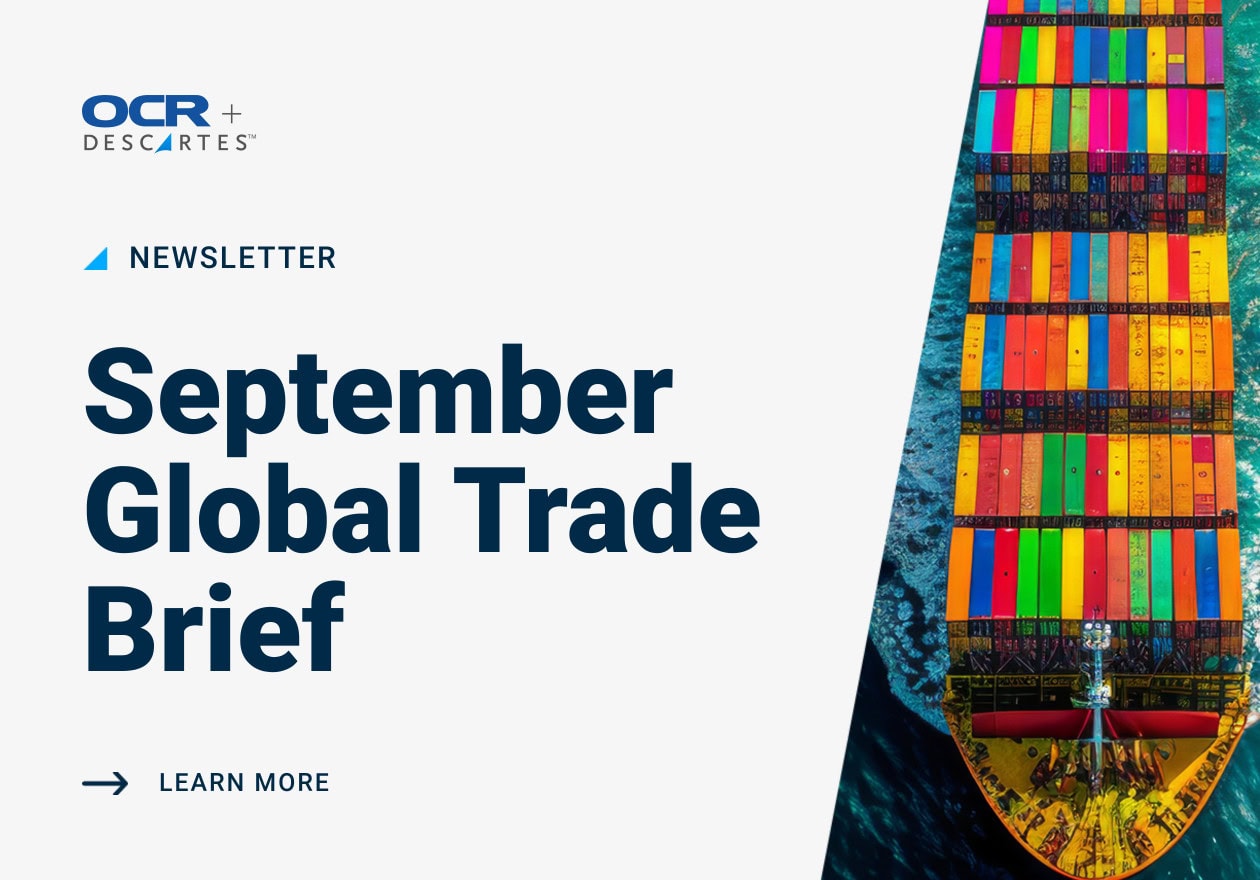US & EU: United States, EU agree to replace and suspend tariffs in steel and aluminum trade disputes
USTR issued a release regarding the U.S. tariffs and EU counter-tariffs originating from the imposition of additional customs duties by the United States on steel and aluminum imports from Europe.
According to the USTR release (October 31, 2021), the following general principles are to “guide future cooperation”—
- Replace Section 232 tariffs with a tariff-rate quota (TRQ). The United States will replace the existing tariffs on EU steel and aluminum products under Section 232 with a TRQ under Section 232. Under the TRQ arrangement, historically based volumes of EU steel and aluminum products would enter the U.S. market without the application of Section 232 tariffs.
- Agree to cooperate in trade remedies and customs matters and development of additional actions. Both sides agreed to expand their coordination involving both trade remedies and customs matters, and to meet regularly to consult and develop additional actions to address non-market excess capacity in these sectors.
- Negotiation of global steel and aluminum arrangements that restore market-oriented conditions and address carbon intensity. The United States and EU resolved to negotiate future arrangements for trade in the steel and aluminum sectors that take account of both global non-market excess capacity as well as the carbon intensity of these industries. They also agreed to form a technical working group to enhance their cooperation and facilitate negotiations on these arrangements, and will invite like-minded economies to participate in the arrangements.
- Lift the EU’s retaliatory tariffs and suspension of disputes before panels of the World Trade Organization. The EU will suspend the additional duties imposed on U.S. goods, and the United States and the EU agreed to suspend the disputes they have initiated against each other regarding the U.S. Section 232 measures and the EU’s additional duties in light of the arrangements for moving forward.
- Other measures relating to market-oriented conditions in the EU market. The EU will provide for market-oriented conditions in its market, including through the application of safeguards and other appropriate measures.
US & CHINA: U.S. reporting concerning watches and clocks subject to Section 301 customs duties
CBP guidance provides that when the band or case component in watches or clocks are made in China:
If the band or case component(s) are not “substantially transformed” and are subject to Section 301 duties, then all of the components need to be constructively separated into their component parts and each component separately valued and reported on separate entry summary lines.
If the band or case component of a watch or clock classified under heading 9101 through 9105 of the Harmonized Tariff Schedule of the United States (HTSUS), has a country of origin of China and the watch or clock has components of one or more additional countries of origin, then filers will be required to break out the country of origin for each component of the watch or clock on a separate entry/entry summary line with the apportioned value. The breakout will allow for the reporting of various countries of origin to pay proper duties on each component, including applicable 301 China duties.
The CBP release further explains by providing the following example:
An importer submits an entry for 1,137 complete watches. The value of the 1,137 watches (including the case, strap, band or bracelet, battery, and movement) classified under HTSUS 9102.11.25 is $154,700.22. This includes the costs of the components and the costs to produce the 1,137 watches. The movements from Japan cost $133,176.81, the cases from Japan cost $11,370, the bands from China cost $8,789.01 and the batteries from Japan cost $1,364.40. The bands were made in China and are subject to Section 301 duties.
Because the watch contains Chinese and non-Chinese components from various countries of origin, each component breakout will need to be reported on a separate entry/entry summary line with the appropriate statistical suffix.
To comply with CBP invoice requirements, the commercial invoice must include a detailed description of the merchandise, materials, value, quantity, HTSUS, and country(s) of origin. The invoice and supporting documents must provide sufficient information to determine the value, quantity, HTSUS classification, and country or countries of origin of the components of the completed watch or clock.
Source: https://content.govdelivery.com/accounts/USDHSCBP/bulletins/2fb3dac?reqfrom=share
US & India: United States and India reach agreement regarding “equalization levy” (digital services tax)
The U.S. Treasury Department announced that the United States and India have reached an agreement on a transition from India’s existing “equalization levy” (digital services tax) to a new international tax framework (under the Two-Pillar solution of the OECD/G20 Inclusive Framework) to be implemented in 2023.
According to today’s Treasury release, the agreement represents “a pragmatic solution” so that the countries can work together toward implementation of the multilateral tax regime. The agreement also allows for the United States to terminate U.S. trade measures adopted in response to the equalization levy. A USTR notice (scheduled to be published in the Federal Register on December 2, 2021) explains that the additional duties on products of India are terminated as of November 28, 2021.
Source: https://public-inspection.federalregister.gov/2021-26198.pdf
U.S. amendment to product exclusion, Section 301 action concerning nonwoven wipes imported from China
USTR released for publication in the Federal Register a notice concerning the Section 301 investigation of China’s acts, policies, and practices related to technology transfer, intellectual property, and innovation.
CBP in September 2020 issued a notice on the tariff classification of certain nonwoven wipes (effective November 30, 2020). USTR notice makes a technical amendment to a product exclusion in the Section 301 investigation to conform with the tariff classification set out in the CBP notice.
The conforming amendment is effective November 30, 2020, and CBP will issue instructions on entry guidance and implementation.
Source: https://public-inspection.federalregister.gov/2021-26482.pdf
U.S. interim final rule removes 30 exclusions from Section 232 tariff exclusions, steel, and aluminum imports
BIS of the U.S. Commerce Department (Commerce) released for publication in the Federal Register an interim final rule that revises the list of exclusions with regard to the imposition of tariff customs duties for imports of aluminum and steel under Section 232 of the Trade Expansion Act of 1962.
A prior interim final rule (December 2020) revised aspects of the process for requesting exclusions from the duties and quantitative limitations on imports of aluminum and steel and added 123 general approved exclusions.
Today’s interim final rule removes 30 exclusions from the December 2020 list of 123 exclusions—26 for steel and four for aluminum imports. The removed exclusions are identified by their Harmonized Tariff Schedule of the United States (HTSUS) codes.
The remaining exclusions continue to apply.
Source: https://public-inspection.federalregister.gov/2021-26634.pdf
U.S. final regulations amending EAR and ITAR regarding Cambodia
Final regulations released for publication in the Federal Register concern the revision of controls for Cambodia under the Export Administration Regulations (EAR) and the International Traffic in Arms Regulations (ITAR).
- A final rule issued by the Bureau of Industry and Security (BIS) of the U.S. Commerce Department amends the EAR to apply more restrictive treatment to exports and reexports to, and transfers within, Cambodia of items subject to the EAR. The final rule also updates a country group designation for Cambodia under the EAR to reflect the country’s identification by the U.S. State Department as subject to a U.S. arms embargo.
- A final rule issued by the State Department amends the ITAR to add Cambodia to the list of countries for which it is the policy of the United States to deny licenses and other approvals for exports and imports of defense articles and defense services. Thus, the United States will deny all licenses and other approvals to export and import defense articles and defense services destined for or originating in Cambodia (except as otherwise provided in the final rule).
Source: https://public-inspection.federalregister.gov/2021-26633.pdf
https://public-inspection.federalregister.gov/2021-26590.pdf
CBP issues “withhold release order” regarding more disposable glove producers in Malaysia
U.S. Customs and Border Protection (CBP) today issued a “withhold release order” on disposable gloves produced in Malaysia by a certain group of companies.
According to the CBP release, the withhold release order is based on information that “reasonably indicates” the use of forced labor in manufacturing operations. CBP identified 10 of the 11 International Labour Organization’s indicators of forced labor during its investigation.
Effective December 20, 2021, CBP officers at all U.S. ports of entry will detain disposable gloves produced in Malaysia by the identified group of companies.
Source: https://public-inspection.federalregister.gov/2021-21493.pdf



